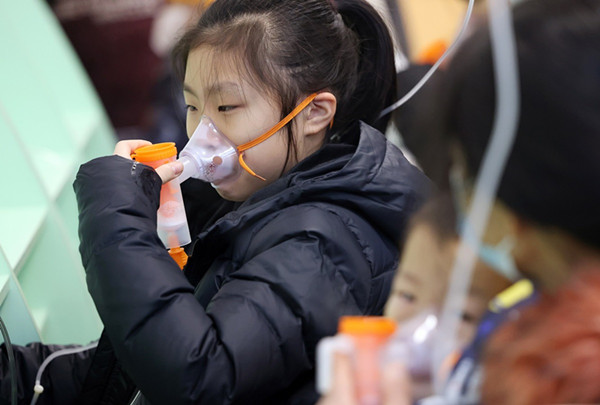Pathogen watch stepped up amid holidays

A sick child receives treatment in the pediatrics department at the PLA Strategic Support Force Characteristic Medical Center in Beijing, Nov 28, 2023. [Photo by Zhu Xingxin/chinadaily.com.cn]
To cope with a potential increase in respiratory illnesses in China during the upcoming holidays, health authorities have called for close monitoring of different pathogens, stepping up vaccination among vulnerable groups and bolstering medical capacities in rural areas.
Currently, the number of domestic COVID-19 infections is at a low level, according to authorities. But Li Zhengmao, an official at the National Administration of Disease Prevention and Control, warned that with the continuous import of JN.1 cases and the mass movement expected during the New Year and Spring Festival holidays, this emerging subvariant of the Omicron strain could rise to dominance and drive a spike in COVID-19 infections in China.
The country has so far reported 490 JN.1 infections, including 47 domestically transmitted cases. The New Year holiday runs from Saturday through Monday, and the Spring Festival holiday from Feb 10 through Feb 17.
"The risk of the elderly, people with chronic diseases and other vulnerable groups developing severe infections or illnesses could rise and rural healthcare systems with relatively weak capacities could come under pressure," Li said at a news conference on Thursday, adding that preparations are underway to tackle the challenge.
The JN.1 subvariant spreads fast and has greater capability of escaping the human immune system, but its pathogenicity has not increased, Li said, noting that COVID-19 vaccines targeting the XBB subvariants of Omicron and antiviral drugs remain effective.
He said that authorities will continue to monitor closely variants that are in circulation worldwide, promptly release early warnings and expand immunization programs targeting high-risk groups with vaccines tailored for the XBB subvariants.
"In the meantime, we will focus on rural areas, strengthening preparedness of their medical resources and ensuring triage of patients," he added.
During another news conference, also held on Thursday, Mi Feng, a spokesman for the National Health Commission, said the increased movement of people visiting friends, traveling for leisure or attending family gatherings during the New Year holiday is expected to fuel the circulation of different respiratory diseases.
"Local administrations must strengthen surveillance, early warning and risk evaluation mechanisms for infections, add to capacities at fever clinics and emergency care, pediatric, respiratory and intensive care units, and take steps to guarantee the supply of regular medicines, testing kits, medical equipment and hospital beds," Mi said.
China has been coping with a surge in respiratory illnesses driven by multiple pathogens this winter, but authorities said the infections have been trending downward over the past few weeks.
However, Mi said that hospital visits by people with respiratory issues rose this week. Flu cases now account for the majority of patients, while the number of mycoplasma pneumoniae cases is falling and COVID-19 infections are at a low level.
Peng Zhibin, an expert from the Chinese Center for Disease Control and Prevention, said that flu cases have peaked in some provinces, but will gradually decrease. The overall spread of other pathogens, including the mycoplasma pneumoniae bacteria, adenoviruses and the coronavirus, which causes COVID-19, is also at a low level, she added.
 Contact Us
Contact Us

 Brilliant light show to illuminate Huangpu River
Brilliant light show to illuminate Huangpu River Maple leaves paint splendid scenery in Pudong
Maple leaves paint splendid scenery in Pudong Appreciate alluring lotus blossoms in Pudong's Century Park
Appreciate alluring lotus blossoms in Pudong's Century Park New pedestrian street boosts Pudong's night economy
New pedestrian street boosts Pudong's night economy 


